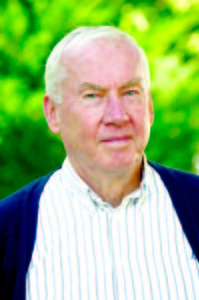Small World: Keeping them straight — enemies and friends
By Henry Precht
BN Columnist
My wife and I visited Washington’s National Gallery the other day to see the marble statue of “The Dying Gaul†on loan from Italy. It is a marvelous piece and you should Google it for photographs and the full story. I’ll offer a couple of my reflections.
The muscular young warrior, is clothed only — as was said of all Gaul fighters — with his sword and shield which now lie under him on the ground. He supports himself with one hand; there is a bleeding stab wound in his chest. His handsome face is a mask of pain and fear of the death that is fast coming. His suffering evokes our pity for his fate, but admiration for his courage.
The statue is a Roman copy of an ancient bronze set up in a temple by the Greek rulers of Pergamon in what is now western Turkey. It commemorated their victory over the invading Gauls (or Celts) who pretty much held sway from Ireland over all of Europe at the time.
Pergamon’s depiction of its defeated enemy is entirely different from what one sees in the carvings and reliefs from ancient Persia or Egypt. There the hated enemy is shown obliged to bear tribute to the conqueror or being crushed under the wheels of his chariot. The dying Gaul still has his dignity; he was a worthy opponent. The battle could have gone the other way. The viewer can understand his ambitions and his loss, even if staunchly opposed to this aggressive foreigner.
Our geopolitical ethic, it seems to me, descends from the Persian/Egyptian line. Caricature with pen dipped in bile is the way we often describe our foes. Hatred of them lasts a long time whether it is Northerners in the eyes of Southerners, Germans in the perception of Jews or Jews as seen by Moslems. It is difficult for many of us to grasp the humanity that lies behind the evil mask we construct for the “other.â€
The same “with us or against us†spirit lies behind the way we depict out friends — our eyes open only to our grateful conviction that they are “with†us. Understandable, if frequently mistaken. A super power should judge with less emotion-twisted perceptions. As Lord Palmerston said when the British Empire was getting geared up, “Nations have no permanent friends or allies, they only have permanent interests.†Washington should adopt the same attitude for our alignments as we shift our imperial engine to a lower gear.
Instead, we are victims of too many of our friends’ favorite dictum in dealing with their enemies: “I’ll hold your coat.†That is, “I’ll hold your coat while you (the U.S.) hit him.†The fellow offering to hold our coat is often someone we wouldn’t really want to invite home to dinner.
Thus, in the Ukraine/Crimea crisis we find ourselves aligned with the coup-produced government in Kiev that depends in part on elements some call “ultra nationalist†and others term “anti-Semitic fascists.†Washington prefers not to talk too much about these new friends. On the other side of the barricades is Russia, in many ways not a pretty face, but a once-great power on which we must rely if we want to deal effectively with many of the complex problems threatening our interests.
Rather than deriding Mr. Putin when he disports himself without a shirt, we ought to try to understand the cloak of Russia’s history and nationalism that clothe his decisions and reactions. Putin and Russia may be faded or flailing, but neither is dying. It may be hard to show understanding while being kicked in the rhetorical shins, but we ought to give it a try.
Henry Precht is a retired Foreign Service Officer.


